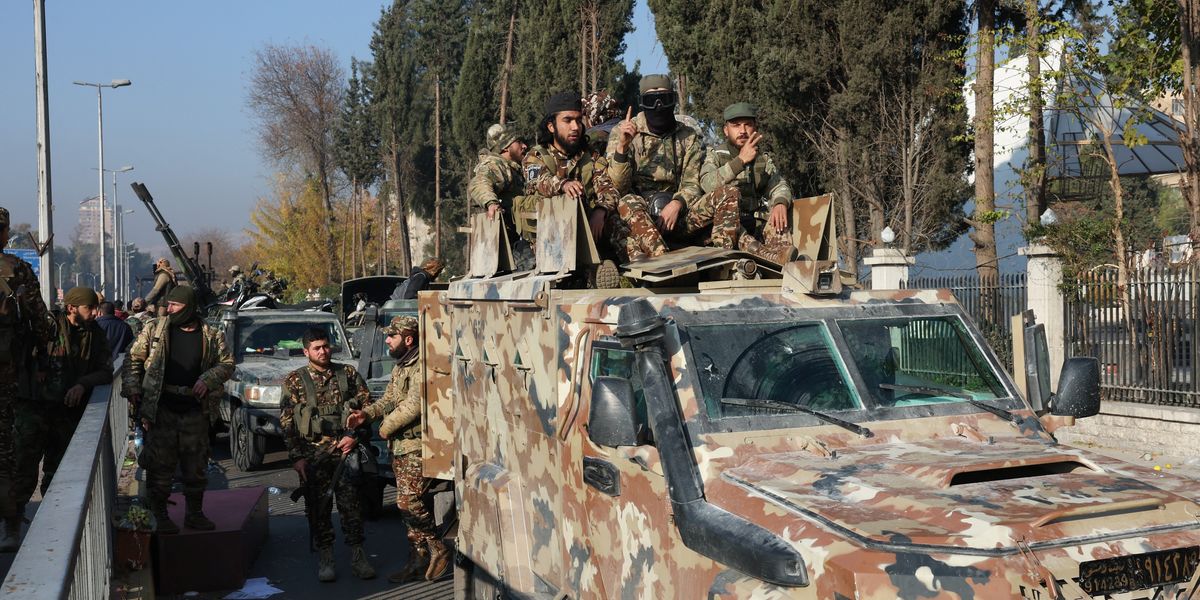World
Europe warned that collapse of Assad regime in Syria could trigger ‘serious spike’ in threat posed by Islamic State

The collapse of President Bashar Assad’s regime in Syria could trigger a “serious spike” in the threat posed by Islamic State (IS) to Europe, the former head of MI6 has warned.
Sir Alex Younger said IS fighters currently being held by Kurdish groups in eastern Syria could escape if their captors “go off the job”.
The stark warning comes just days after Assad fled to Russia following a lightning offensive by rebel forces that saw Damascus fall to opposition groups on Sunday.
The situation has raised immediate concerns about the security of detention facilities housing thousands of IS militants across Syria.
Rebel fighters sit on a vehicle, after rebels seized the capital and ousted President Bashar al-Assad
Reuters
The United States, which has 900 soldiers on the ground in Syria operating alongside Kurdish-led forces in the east, said its forces hit around 75 targets in air strikes against Islamic State camps and operatives .
Younger told BBC News: “For us, I think we need to be realistic. The reality, the one thing you know about Syria for sure, proven by history, is that attempts to impose change from the outside will not work.
“This is very much a Syrian future for Syrians to decide and we should of course support anything that moves Syria towards a more positive state.
“But we also have some hard interests and the primary one of those as I have said before is the existence of a very large number of Isis detainees left over from the destruction of the caliphate, currently contained by the Kurdish groups in the east. But if they go off the job you can expect a serious spike in the threat posed to Europe by Isis.”
LATEST DEVELOPMENTS

A damaged picture of Syria’s Bashar al-Assad lies on the floor inside Qamishli international airport
Reuters

Sir Alex Younger
Getty
During a visit to Japan, US Secretary of Defence Lloyd Austin explained the reasoning behind the operation against the IS camps.
“There’s a potential that elements in the area, such as ISIS, could try to take advantage of this opportunity and regain capability… Those strikes were focused on those cells,” he said.
President Joe Biden has also pledged to maintain the US mission against IS, including securing facilities where fighters are being held as prisoners.
“We’re clear-eyed about the fact that ISIS will take advantage of the vacuum. We will not let that happen,” Biden said.

Members of the Kurdish-led Syrian Democratic Forces (SDF) gesture in Deir al-Zor
Reuters

US Secretary of Defence Lloyd Austin speaks during a press conference
Getty
The UK’s independent reviewer of terrorism legislation has expressed similar concerns about the power vacuum in Syria.
Jonathan Hall KC told The Times he is “as worried as I was with Libya, Iraq and Afghanistan” about the potential for new extremist groups to emerge.
Former MI6 chief Richard Dearlove warned that “lone-wolf” extremists formerly imprisoned by Assad could pose significant threats.
“The organisational structure of (Daesh) is significantly weakened. The question is whether this fuels lone-wolf terrorists or an organised conspiracy,” Dearlove said.










